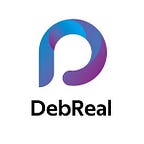DEBREAL SOLVING THE COPYRIGHT PROBLEM ON DIGITAL ASSETS — ESPECIALLY ON NFTS
NFTs — the biggest buzzword on blockchain and crypto markets with huge opportunities and challenges
NFT markets are booming. We have new NFT marketplaces popping up every day. Hundreds of YouTube videos explaining how everyone can make NFTs and/or how everyone can make a lot of money by selling the NFTs on the secondary markets.
What do you own when you own an NFT?
NFTs are digital assets which in the most cases are displayed on NFT marketplaces. Do the NFT marketplaces protect the copyright and ownership of the NFTs on their platform?
No…
Anybody can take a copy of an NFT. Upload it on e.g., on a laptop and do whatever they want with it — sending it further, changing it or selling it in the worst case make another NFT of the same!
Actually, it is easier to explain what you do not own when you “own an NFT”…
You do not own the digital asset itself which exists “off-chain” (not on the blockchain). If you buy an NFT you are buying a token which “represents” the NFT. The ownership of the token (not the digital asset) will be proven by digital signature on the blockchain.
Is it even possible to solve the copyright and ownership problem on NFTs?
Yes… it is possible!
Solution — DebReal
As already mentioned above, in most cases digital assets representing the NFTs exist “off-chain”. Solving the ownership problem on NFTs needs to start from understanding can the NFT ownership and copyright problem be solved by using both “on-chain” (token and digital signature) and “off-chain” (the actual digital asset, NFT) environments.
DebReal blockchain platform solves the NFTs’ copyright and ownership problem by creating a standard for mutual secure collaboration of “on-chain” data and “off-chain” encrypted digital files.
It has a groundbreaking design that allows for decentralized storage combined with unnoticeable security. By combining the kernel layer of the operating system with blockchain, DebReal is able to protect both on-chain data and the full life cycle of off-chain files, of all data formats.
Got interested?
More on the DebReal White Paper (link to the White Paper)
